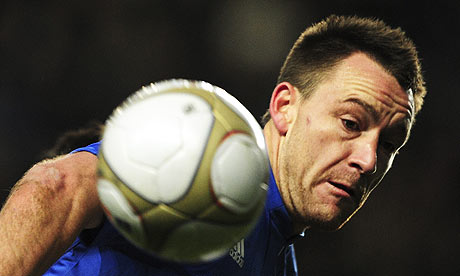High court overturns superinjunction granted to England captain John Terry
Posted Saturday, January 30, 2010 by theguardian.com

England captain John Terry emerged as the footballer who had obtained a gagging order preventing the publication of claims about his private life, after the high court overturned a superinjunction yesterday.
Lawyers for Terry won a high court injunction last Friday, having learned that the News of the World planned to write about his private life. Under the terms of the superinjunction, agreed on privacy grounds, newspapers were unable to reveal who had applied to stop the story.
The judge, Mr Justice Tugendhat, lifted the injunction yesterday. It follows the Trafigura affair in October, when the oil trading company tried to use a pre-existing superinjunction – which prevents even the existence of an injunction from being known – to stop the Guardian reporting a parliamentary question until the outcry forced Trafigura and their lawyers Carter-Ruck to back down.
In the Terry case, Tugendhat said: "I do not consider that an interim injunction is necessary or proportionate having regard to the level of gravity of the interference with the private life of the applicant that would occur in the event that there is a publication of the fact of the relationship, or that [the applicant] can rely in this case on the interference with the private life of anyone else."."
Although the judge did not name Terry in his order he was the player who made the application.
And while the injunction did not cite a specific paper, the judge said the evidence named News Group Newspapers (NGN), the publisher of the News of the World.
Tom Crone, News of the World legal manager, said later: "We welcome Mr Justice Tugendhat's decision as a long overdue breath of fresh air and common sense coming out of the privacy courts. Over recent years, there has been more prior restraint on freedom of speech in Britain than in any other democratic country in the world.
"Gagging orders like the one sought by John Terry have been granted to numerous other Premier League footballers and assorted celebrities. Hopefully today's victory by the News of the World will lead to a fundamental reassessment of our draconian privacy laws.
"The British public's right to know has been the victim of this legal process. Hopefully that will now change."
The judge criticised Terry's lawyers, Schillings, for not giving newspapers notice of the action they were taking.
"Notice has not been given to any newspaper when it should have been, and, as a result, I have not had the benefit of arguments in opposition to the application, which might have assisted me to be satisfied of the matters of which I am not satisfied," he said.
He rejected arguments that they had not notified anyone about the application because their client did not know of any media organisation with a "specific interest in the story".
"The evidence shows that NGN were intending to publish a story about [the applicant] on the Sunday ... In my judgment the interest that NGN did show in publishing a story meant that they should have been given notice."
He also mentioned a letter from the Guardian that "illustrates the importance of open justice" in just such a case.
The use of the superinjunction is likely to reignite the debate about the use of human rights laws by public figures to prevent stories being placed into the public domain. Critics say several rulings based on the 1998 Human Rights Act have effectively created a privacy law in the UK, which has always shied away from legislation to protect the rich and powerful.
The issue was highlighted last October, when oil trading company Trafigura which prevented the Guardian from reporting a parliamentary question.
That prompted an online outcry, particularly on Twitter, and Trafigura's law firm Carter-Ruck werewas forced to drop the injunction. In a landmark case in 2008, high court judge Mr Justice Eady ruled that the News of the World had breached the privacy of Formula One boss Max Mosley. The paper had to pay damages.
The justice secretary, Jack Straw, announced this week the make-up of the panel to investigate reform of libel law, with members including Sunday Times editor John Witherow and Andrew Stephenson, a Carter-Ruck partner.
Photos
More»[PICTURE SPECIAL] Arsenal 5-0 Chelsea
Wednesday April 24 2024Marcos Llorente’s wife wows in barely there swimsuit
Wednesday April 24 2024



Your Say